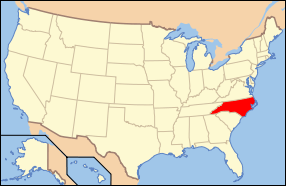Monroe Residential Historic District (Monroe, North Carolina)
|
Monroe Residential Historic District | |
|
James H. Lee House, built in 1912 | |
  | |
| Location | Roughly bounded by Hough, Franklin, Jefferson, McCarten, Windsor, Sanford, Washington. Braden, Church & Hudson Sts., Monroe, North Carolina |
|---|---|
| Coordinates | 34°58′45″N 80°33′01″W / 34.97917°N 80.55028°WCoordinates: 34°58′45″N 80°33′01″W / 34.97917°N 80.55028°W |
| Area | 181 acres (73 ha) |
| Built | 1874 |
| Architect | Tucker, G. Marion; Wheeler & Stern |
| Architectural style | Classical Revival, Italianate, Queen Anne |
| NRHP Reference # | 87002204[1] |
| Added to NRHP | January 6, 1988 |
The Monroe Residential Historic District is a national historic district located at Monroe, Union County, North Carolina. It encompasses 376 contributing buildings, 1 contributing site, and 4 contributing objects in a predominantly residential section of Monroe. The district developed between about 1874 and 1940 and includes notable examples of Italianate, Queen Anne, and Classical Revival architecture styles and includes work by architects Wheeler & Stern and by G. Marion Tucker. Notable buildings include the R. V. Houston House, Houston-Redfearn House, the Belk House, J. H. Lee House, M. G. Sheppard House, Elizabeth Friedeman House (c. 1880), former Methodist Parsonage (c. 1886), Gaston Meares House, William E. Cason House, M. G. Sheppard House, and George B. McClellan House.[2]
It was listed on the National Register of Historic Places in 1988.[1]
References
- 1 2 National Park Service (2010-07-09). "National Register Information System". National Register of Historic Places. National Park Service.
- ↑ Allison H. and David R. Black (June 1987). "Monroe Downtown Historic District" (pdf). National Register of Historic Places - Nomination and Inventory. North Carolina State Historic Preservation Office. Retrieved 2014-08-01.
_1.jpg)

